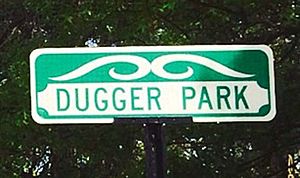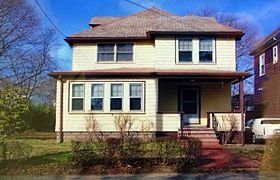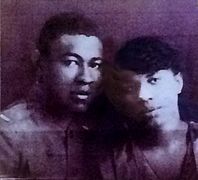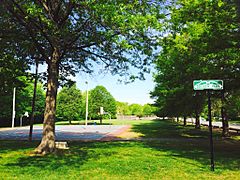Edward Dugger facts for kids
Quick facts for kids
Edward Dugger
|
|
|---|---|
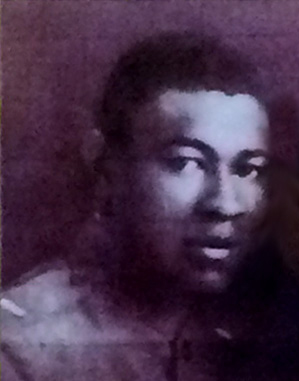
Dugger circa 1917
|
|
| Personal details | |
| Born |
Edward Dugger
June 6, 1894 Finchley, Virginia, U.S. |
| Died | March 5, 1939 (aged 44) Chelsea, Massachusetts, U.S. |
| Cause of death | polycystic kidneys |
| Spouse |
Madeline Mabray Kountze
(m. 1917) |
| Awards |
|
| Military service | |
| Allegiance | |
| Branch/service | |
| Years of service | 1914–1936 |
| Rank | |
| Unit |
|
| Commands |
|
| Battles/wars | |
Edward Dugger (June 6, 1894 – March 5, 1939) was an important military leader and a respected African American citizen from Medford, Massachusetts. He served bravely in World War I and rose to the rank of lieutenant colonel. Beyond his military career, Dugger was a dedicated community leader. He helped bring the Boy Scouts to his area and was the first African American to join the Medford City Planning Board. A public park in Medford, "Dugger Park," is named in his honor.
Contents
Edward Dugger's Early Life and Education
Edward Dugger was born in Finchley, Virginia, on June 6, 1894. He was the youngest of eight children. His father, William, had been a slave. When Edward was young, his family moved to Natick, Massachusetts. There, he went to elementary school and was part of the Boys' Patrol.
Later, his family moved to Boston, where he attended Boston English High. During high school, Edward was a talented track athlete. He was also part of his school's military training group. After graduating in 1914, he joined the National Guard. He then enlisted in Company L of the 6th Massachusetts Infantry. On October 14, 1917, he became a first lieutenant at Fort Des Moines. A few weeks later, he married Madeline Mabray Kountze from West Medford.
Military Service in World War I
In June 1918, Edward Dugger began his military duty overseas during World War I. At first, the British Army trained American soldiers. However, they refused to train the 92nd and 93rd Divisions, which included many African American soldiers. To solve this, the United States sent these troops to the French Army, who needed more soldiers.
Facing Challenges Overseas
Life for soldiers during the war was very tough. They often slept and fought in muddy trenches. Edward Dugger's son, Cortland, described the difficult conditions. Soldiers faced rain, cold, and many diseases. They were sometimes exposed to poison gas, and their uniforms were not always warm enough. Despite these challenges, Dugger served with bravery. He earned a special award for his courage.
Community Leadership in Medford
Edward Dugger returned home in March 1919. He first joined the Boston Police Force. Later, he worked for the Postal Service for 15 years until he retired. Edward and Madeline had six children between 1919 and 1930. They built a large house on Jerome Street in West Medford for their family.
During this time, Dugger continued his military service. He became a major and then a captain of Company K of the 372nd Infantry Regiment. In December 1930, he became the commanding officer of this unit. He dedicated a lot of his energy to the unit until he retired from it in 1936.
A Legacy in Public Service
At home, Edward Dugger was a great example of duty and leadership. He was the President of the West Medford Men's Community Club. He also led the Citizen's Committee that helped bring Boy Scouts Troop No. 11 to the area. In 1936, Mayor Irwin appointed him to the Medford City Planning Board. He was the first African American to serve on this board. However, he could only serve for two years due to his health.
Illness and Death
Between 1936 and 1938, Edward Dugger retired from all his positions. He had been sick for many years with a condition called polycystic kidneys. His health continued to get worse. On March 5, 1939, Edward Dugger passed away at the U.S. Naval Hospital in Chelsea, Massachusetts. He was 44 years old.
Remembering Edward Dugger
Later in 1939, the City of Medford did something special. For the first time, they honored an African American citizen by naming a public park after him. This park was called "Dugger Park." It is located along the Mystic River at Harvard Avenue. Today, the park has tennis and basketball courts, a baseball field, and a playground.
Dugger Park: A Lasting Tribute
At the park's dedication, Attorney Matthew Bullock said the park would "be a large factor in moulding the lives of the children of this community." And he was right! Dugger Park hosts many community events. A sign at the corner of Harvard Avenue and Mystic River Road even has graffiti from local kids calling it "The Action Plase [sic]," showing how much they love it.
Besides Dugger Park, the Medford Public Library also has an exhibit about Edward Dugger. It is part of their "Leaders in the Military" display.
Gallery


